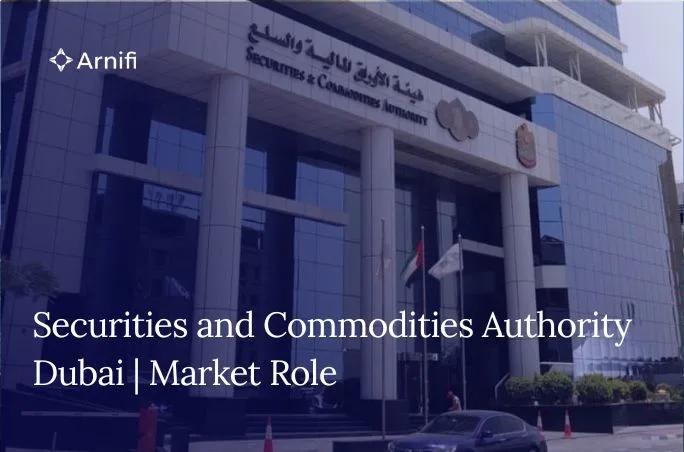Securities and Commodities Authority in Dubai | How It Regulates Financial Markets
by Ishika Bhandari Nov 27, 2025  8 MIN READ
8 MIN READ

Table of contents
- Overview of Securities and Commodities Authority UAE
- How SCA Oversees Markets in Dubai?
- Core Functions and Powers of SCA
- Securities and Commodities Authority Dubai Location and Presence
- Licensing and Authorisation for Market Participants
- Governance and Investor Protection Rules
- Careers Linked to the Securities and Commodities Authority
- How SCA Interacts With Other UAE and Global Bodies
- Conclusion
- FAQs
While buying or selling shares in the UAE, trades sit under one main onshore market regulator. That body is the securities and commodities authority Dubai investors often hear about, usually shortened to SCA. The authority was created in 2000 under Federal Law No. 4 with legal and financial independence, reporting to the Cabinet.
SCA sets rules, licenses markets and supervises the main onshore exchanges, including the Dubai Financial Market and the Dubai Gold and Commodities Exchange. For listed companies, brokers and fund managers, understanding how SCA works is now a basic part of staying compliant in Dubai and across the federation.
Overview of Securities and Commodities Authority UAE
The Securities and Commodities Authority UAE is the federal regulator for securities and commodities in onshore UAE. It was set up in January 2000 to supervise and develop these markets at law and policy level.
SCA aims to protect investors and keep markets transparent and fair. It handles licensing and disclosure rules, besides market monitoring and action against misconduct such as insider trading or market manipulation.
The authority also issues corporate governance rules that guide how public joint stock companies operate, including internal controls and board duties. Free zones such as DIFC have their own regulators, so SCA mainly focuses on mainland UAE and onshore exchanges.
How SCA Oversees Markets in Dubai?
Dubai hosts several key markets that sit inside SCA’s scope. The Dubai Financial Market handles equities and related instruments. The Dubai Gold and Commodities Exchange runs derivatives on metals and currencies. Both operate under SCA approval and must follow its rules on trading, clearing and settlement.
SCA approves exchange rulebooks, monitors trading patterns and can require changes where risks appear. The authority also works with exchanges on investor education, awareness campaigns and complaint handling. For example, investor rights guides explain how clients should be treated by licensed intermediaries and what they can do when problems arise.
In practice, firms licensed by SCA must keep systems that support these goals. That includes order recording, best execution policies and clear segregation of client assets.
Core Functions and Powers of SCA
SCA’s functions spread across several areas that every market participant should know. These powers help SCA keep markets orderly and protect investors who rely on correct information and fair access.
- Market supervision and surveillance to detect abusive trading and other misconduct across listed instruments.
- Licensing and ongoing oversight of brokers, dealers, fund managers and other intermediaries that operate in onshore markets.
- Rule making for disclosure and listing. Also, for corporate governance and internal controls for public joint stock companies and listed funds.
- Enforcement actions, including fines and suspension of licences, when firms or individuals breach regulations.
Securities and Commodities Authority Dubai Location and Presence
The authority is a federal body headquartered in Abu Dhabi. Yet it also maintains a strong presence in Dubai. Official contact information and public directories show SCA offices in Al Gaith Tower on Hamdan Street in Abu Dhabi. They also show an SCA building in the Al Garhoud area in Dubai.
For many firms, the securities and commodities authority Dubai location matters because face to face meetings, inspections and training sessions often happen at the Dubai office. Licensed firms should keep current contact points, phone numbers and service desk links so they can respond quickly to any query or request.
The authority also reaches users through online portals and e services, where licence applications, renewals and certain notifications can be filed digitally.
Licensing and Authorisation for Market Participants
Any person or company that wishes to carry out securities business in mainland UAE usually needs SCA authorisation. That covers brokerage firms, investment companies, some advisory businesses and many fund managers.
Licensing conditions focus on fit and proper tests for owners and senior managers and adequate capital. Besides that, sound internal controls and the ability to meet reporting duties are mandatory. Firms must submit detailed applications with business plans, compliance frameworks and risk procedures.
Once licensed, firms fall under routine supervision. They may face periodic inspections, thematic reviews and requests for data. Exchanges such as DFM and DGCX also require member firms to hold valid SCA licences and follow joint rules.
In recent years, SCA has tightened fund distribution and introduced new regimes for investment funds, which affect how foreign and local products reach retail clients in Dubai.
For SCA-licensed brokers and investment firms, clean books matter as much as trading systems. Arnifi’s accounting and bookkeeping services in UAE keep trial balances, capital calculations and fee records aligned with SCA expectations, so licence renewals and routine inspections rest on well organised numbers.
Governance and Investor Protection Rules
SCA uses governance codes and investor protection tools to raise confidence in UAE markets. These measures aim to keep markets fair and transparent so local and foreign investors can trust prices and company information.
- Corporate governance rules set clear expectations for board composition and committee structures. They also guide how listed companies report to the market.
- Internal control rules push boards to build strong risk and compliance functions. Yearly reviews of these controls are reported to shareholders.
- Disclosure rules require timely and accurate updates on financial results and major transactions. They also cover insider dealings and other market sensitive events.
- Investor education guides explain basic rights and complaint channels. They outline key risks in trading and in leveraged products.
Careers Linked to the Securities and Commodities Authority
Interest in securities and commodities authority Dubai careers has grown as the UAE capital markets expand. Roles at SCA itself span supervision, legal analysis, enforcement, policy drafting and data analytics. Staff often have backgrounds in law, accounting, economics or financial engineering, combined with strong Arabic and English skills.
Beyond the authority, its rulebook supports thousands of jobs across licensed firms. Brokers, compliance officers, risk managers, corporate secretaries and investor relations teams all work inside the ecosystem built by SCA regulations.
As new products such as sustainable finance assets appear, demand for people who understand both technology and regulation grows further. Graduates who aim to work in this field should track SCA announcements, scholarship schemes and training programmes, plus similar programmes on major exchanges and at regulated firms.
How SCA Interacts With Other UAE and Global Bodies
SCA does not operate in isolation. It coordinates with the Central Bank, insurance and free zone regulators to keep rules aligned and avoid gaps.
Internationally, SCA signs memoranda of understanding with regulators such as ASIC and participates in bodies like IOSCO to share information and best practices on supervision and enforcement.
These links help Dubai remain attractive for cross border listings and investment flows. They also support cooperation when misconduct crosses borders, for example, in insider dealing or mis-selling cases tied to overseas investors.
Conclusion
For any company that lists shares or works as an intermediary in Dubai, SCA rules must be followed keenly. Learning how the authority is structured and what it expects will reduce compliance risk. Also, it makes regulatory conversations smoother as business grows in UAE markets.
As SCA supervision deepens, accounting and bookkeeping become part of front-line compliance for market participants. Arnifi helps Dubai and UAE securities firms keep daily records, reconciliations and reports in order, so conversations with the securities and commodities authority Dubai stay focused on strategy and growth instead of missing data.
FAQs
Q1. Does SCA regulate every financial activity in Dubai?
No. SCA regulates securities and commodities activity in onshore UAE, including DFM and DGCX. Financial free zones such as DIFC have their own regulators.
Q2. Where is the main office of the Securities and Commodities Authority located?
SCA is headquartered in Abu Dhabi, with offices in Al Gaith Tower on Hamdan Street and an SCA building in Dubai’s Al Garhoud area.
Q3. Which markets in Dubai does SCA oversee?
SCA supervises the Dubai Financial Market and the Dubai Gold and Commodities Exchange as onshore regulated markets. It approves their rules and ensures that member firms follow licensing and conduct requirements set at federal level.
Q4. Who needs an SCA licence?
Brokers, dealers, some advisory firms, fund managers and other intermediaries that carry out securities business in mainland UAE usually need SCA authorisation. Exchanges also require members to hold valid licences and meet capital, governance and reporting standards.
Top UAE Packages

Related Articles
Top UAE Packages



